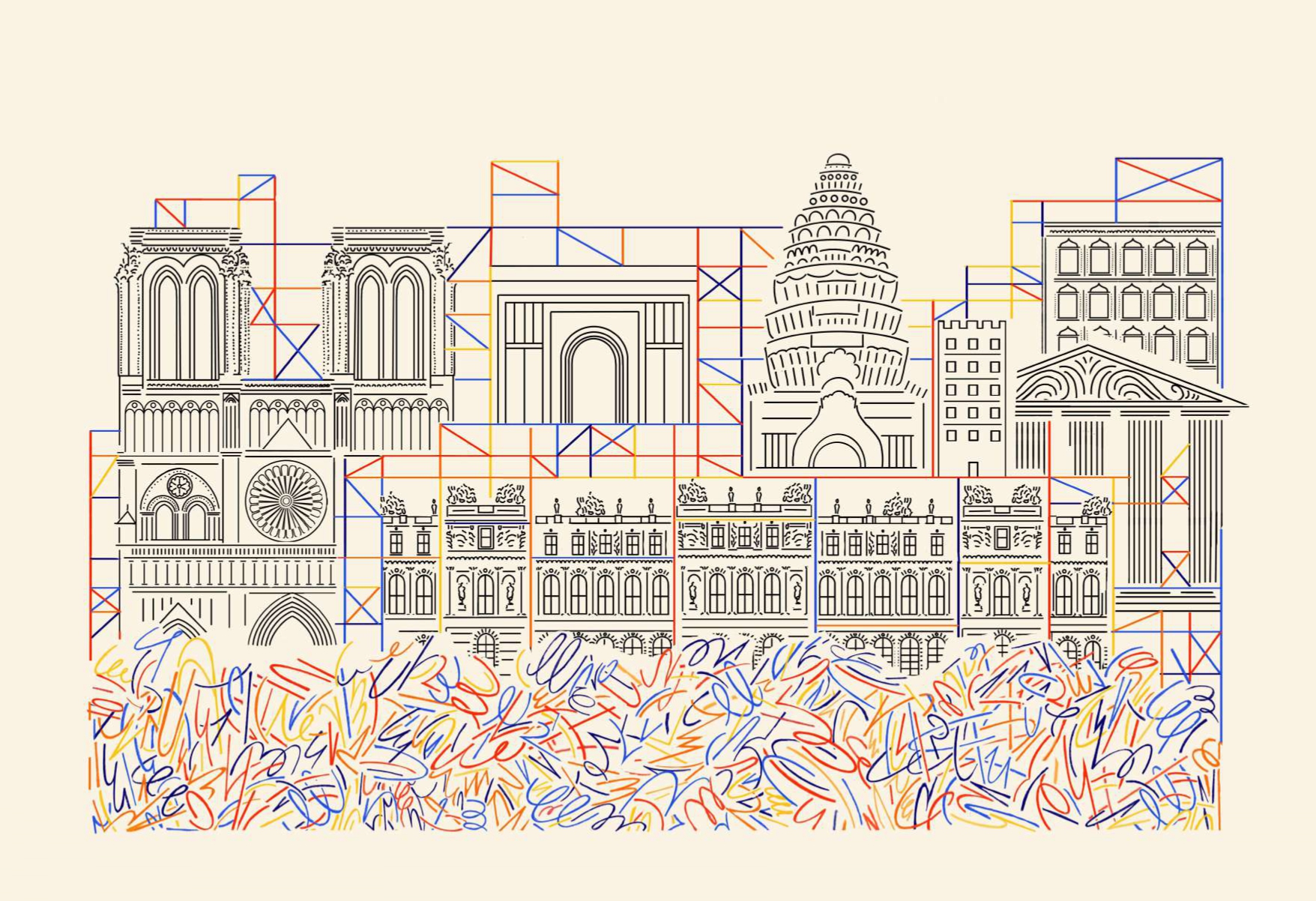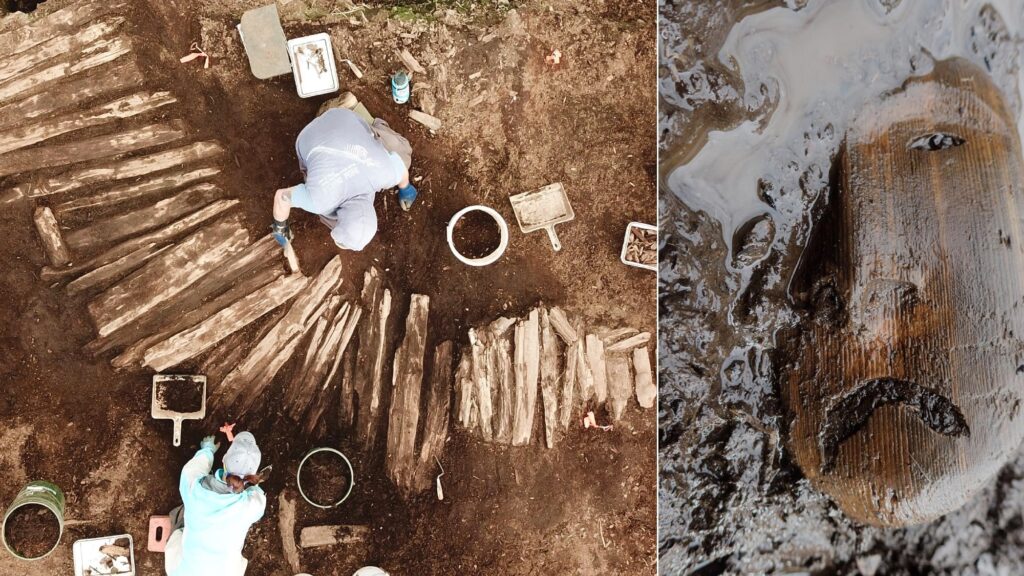Villa Albertine and World Monument Fund (WMF) launch public event series on preserving at-risk cultural heritage sites

Spring Heritage Speaks events spotlight Nunalleq, Alaska; Notre-Dame of Paris, France as the focus of WMF’s annual Paul Mellon Lecture; and Angkor Wat, Cambodia, with more expert talks coming later in the year.
February 27, 2024 – Villa Albertine and World Monuments Fund (WMF) today announced the collaborative launch of Heritage Speaks, a public discussion series exploring the diverse threats facing cultural heritage across the globe. From the impacts of climate change to armed conflict and over-tourism, this set of talks will unpack the challenges facing historic places and the best preservation solutions emerging among experts and local communities. Scheduled throughout the year, the talks will be open to the public and provide attendees with an expansive forum to learn how we approach global heritage in a changing world.
The monthly series will begin on March 27 at the Villa Albertine headquarters (972 Fifth Avenue, New York, NY) with an in-depth look at the rapid climate-induced erosion destroying the Nunalleq archaeological site in Alaska, a crucially important site for the Indigenous Yup’ik community. The panel will include Villa Albertine resident Claire Houmard, Director of the French archaeological mission in Alaska, Université de Franche-Comté and Villa Albertine Resident; Rick Knecht, Lead Archaeologist, Nunalleq Archaeological Project, University of Aberdeen; Jonathan Bell, Vice President of Programs at WMF; and Ann Cuss, Regional Director, North America at WMF. While Knecht and Houmard have worked on the Nunalleq site together for the past decade alongside local teams, Houmard’s recent excavations, first launched in 2022, are sponsored by the French Ministry of Foreign Affairs and by Villa Albertine, with further support from ENGIE. Cuss will bring several perspectives from sites in North America facing similar issues, such as at Bears Ears National Monument, where WMF is supporting initiatives undertaken by Indigenous communities to enhance site management and promote respectful visitation.
The second event of the ‘Heritage Speaks’ series will take place on April 18 as WMF’s annual Paul Mellon Lecture focuses on the five-year reconstruction of Notre-Dame of Paris, widely considered the biggest restoration project of the twenty-first century. Inaugurated in 2003, the Paul Mellon Lecture is supported by the Paul Mellon Education Fund and enables audiences to learn about the critical issues in the field of cultural heritage. The April 18 panel will bring together art historians, firefighters, and craftsmen to reflect on methodologies developed during the process and the advancement of fire protection for similar cultural heritage sites.
The event on May 21 will spotlight Cambodia’s Angkor Archaeological Park and the cutting-edge efforts undertaken to preserve and restore this iconic UNESCO World Heritage site. Art historians, curators, and archaeologists will illuminate issues the site faces, including natural erosion and looting, and the challenges in creating a balanced tourism system. Since 1989, WMF has been involved at the site, partnering with the Cambodian government to help build local technical capacity to aid restoration efforts throughout the park.
“As cultural counselor of France in the US and director of Villa Albertine, I am convinced that preserving cultural heritage is essential and part of our mission,” said Mohamed Bouabdallah. “Heritage speaks is designed to bring forward groundbreaking, multidisciplinary, and in many cases international solutions to the challenges facing our cultural heritage today. We are therefore delighted to partner with World Monuments Fund, whose impact has been so important in this field, to organize this series.”
“Education is at the core of our mission at World Monuments Fund,” said Bénédicte de Montlaur, President and CEO of WMF. “Through this exciting partnership with Villa Albertine, we are thrilled to establish new public forums that discuss the global complications cultural sites face. This opportunity also highlights the innovative methodologies professionals create and allows the public a free space to interact and learn about these prospects.”
This fall, the series will raise awareness of several more challenges and success stories in cultural heritage preservation, focusing on heritage issues in conflict areas. These talks will spotlight the efforts and interventions facilitated by the International alliance for the protection of heritage in conflict areas (ALIPH), a foundation launched on the initiative of France and the United Arab Emirates in 2019 to protect heritage sites in danger.

The Nunalleq Archaeological Site in Alaska (left), Mask Emerging from Permafrost (right)
In partnership with

World Monuments Fund (WMF)
World Monuments Fund (WMF) is the leading independent organization devoted to safeguarding the world’s most treasured places to enrich people’s lives and build mutual understanding across cultures and communities. The organization is headquartered in New York City with offices and affiliates in Cambodia, France, India, Peru, Portugal, Spain and the UK. Since 1965, our global team of experts has preserved the world’s diverse cultural heritage using the highest international standards at more than 700 sites in 112 countries. Partnering with local communities, funders, and governments, WMF draws on heritage to address some of today’s most pressing challenges: climate adaptation, inclusive heritage, balanced tourism, and post-crisis recovery. With a commitment to the people who bring places to life, WMF embraces the potential of the past to create a more resilient and inclusive society.
